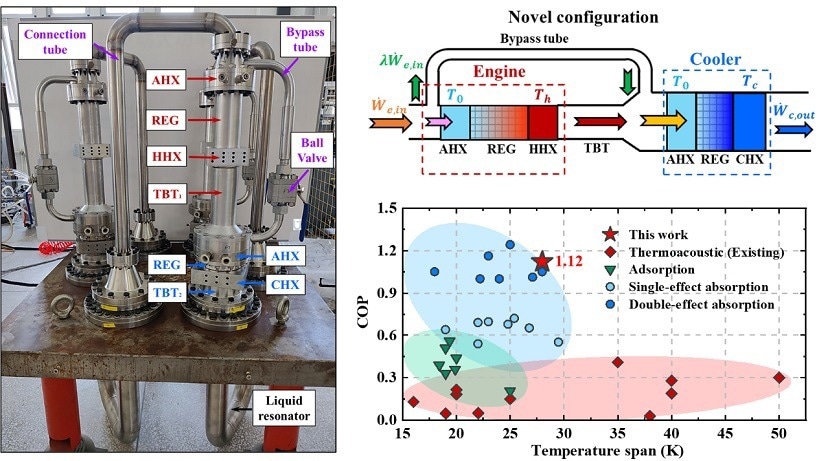
The developed novel heat-driven thermoacoustic refrigerator and its performance. Image Credit: Technical Institute of Physics and Chemistry (TIPC)
It is acknowledged that HDTR is a novel, exciting cooling technology with numerous benefits. It is extremely dependable, for instance, and uses environmentally beneficial materials like nitrogen and helium instead of moving parts. Its comparatively low efficiency, however, has made practical deployment difficult.
The coefficient of performance (COP), or the ratio of output cooling power to input heating power, can be used to measure the efficiency of HDTRs. Using current advanced direct-coupled HDTRs, the researchers discovered an unexpected drop in COP as the heating temperature increased. They also discovered the cause, which is that these systems have a temperature-matching limitation that inhibits COP improvement at high heating temperatures.
The researchers came up with a clever bypass design to get around the temperature-matching limitation to get beyond this barrier. By allowing for a portion of the acoustic power to be bypassed, this innovative architecture enables effective acoustic power matching between the engine and cooler units at high heating temperatures.
The system attains energy flow field synergy as a result, greatly increasing efficiency. Next, the scientists constructed a prototype HDTR on a kilowatt size. At the heating, ambient, and cooling temperatures of 450 °C, 35 °C, and 7 °C, respectively, they obtained a record-high experimental COP of 1.12 with a cooling capacity of 2.53 kW using helium as the working gas. This COP is 2.7 times greater than the best result ever obtained for HDTRs that are currently in use.
The researchers claim that their new HDTR technology operates on par with double-effect absorption refrigerators in the realm of room-temperature, heat-driven refrigeration, surpassing both adsorption refrigerators and single-effect absorption refrigerators. These outcomes demonstrate how promising this innovative HDTR technology is for use in commercial air conditioning applications.
In comparison to helium, nitrogen is a more abundant, cost-effective, and environmentally friendly refrigerant. As a result, the researchers used nitrogen to test the system's functionality. The COP results outperform the ones that TIPC previously released.
Because it uses thermal energy at a high temperature more efficiently than absorption refrigerators, the researchers assert that the new HDTR system has an innately greater COP. For the suggested HDTR system, their numerical research indicates an exceptional potential COP value of 2 at a heating temperature of more than 800 °C.
To further enhance the system's cooling capabilities, the researchers said they would modify the existing setup and raise the heating temperature. They expect that after such adjustment, in the near future, they will surpass double-effect absorption refrigerators in terms of COP.
Journal Reference
Xiao, L., et.al., (2024). A highly efficient heat-driven thermoacoustic cooling system. Cell Reports Physical Science. doi.org/10.1016/j.xcrp.2024.101815
Source: https://english.cas.cn/